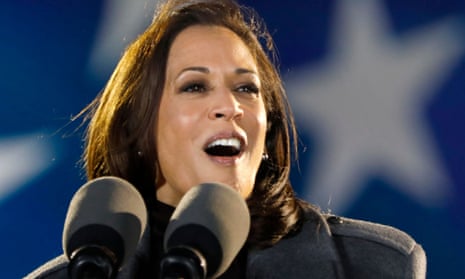Bettina Love: ‘Joy and hope … but no honeymoon period’

To be able to say the words “Vice-president Harris” and know I am talking about a Black woman is a feeling like no other. A feeling of joy, hope and vindication. I am excited to see a Black woman as vice-president of the United States. It has taken centuries of pain, struggle and joy to get to this accomplishment, but many Black women today are smiling under our masks.
When I think about Harris, I remember her performance at Senate hearings: the way she challenges people, cross-examines them, and handles herself in a room. I hope that’s the energy she brings as vice-president. And, of course, I think of the moment during the primaries when she took President Biden to task over his opposition to bussing in the 1970s, when he was a senator. We all knew Biden was the frontrunner, and that Harris would most likely be his running mate, so the fact that she was willing to hold him to the fire on that issue showed not only her toughness, but her commitment to the truth. She was willing to attack the top candidate. That’s what you want from a leader – someone who’s not afraid to go after facts and find the truth. At the end of the day, she’s a great politician. I just want her to be a great politician on behalf of the most vulnerable people in our society.
Of course, she has a record on criminal justice that is troubling. But I’m hopeful that grassroots and national organisations will push her to the left. I hope she is ready to address the harm that the criminal justice system has done to Black and brown communities up close.
I am so looking forward to watching Harris walking out of the White House for the first time, so that I can show my kids: look, there’s a Black woman as vice-president. But representation is only representation: we need actual results. Black women are going to rejoice that she’s won, and wish her all the joy she can handle, and then turn to her and say: let’s go, sis! Harris isn’t going to get a honeymoon period, because she’s a Black woman in a racist and sexist country. It’s always tougher for women. The opposition are going to be critical of every step she takes. The first Black vice-president and the first female vice-president – she will be under scrutiny like never before.
The Biden-Harris administration needs to move fast. We don’t have much time to turn things around. There’s the pandemic, of course. We’ve got 545 migrant children who don’t know where their parents are – reuniting them needs to be a priority. We need to fight to keep Roe v Wade, and Obamacare. And I want to see action on violence against women, and educational equity in our schools, particularly for Black and brown girls. That’s a lot for Harris to achieve in four years. And I’m ready to fight with her.
Bettina Love is an author, academic and activist
Mahogany L Browne: ‘I need to believe you can help change the justice system’

I know what it means for your name to be misspelled. I know what it means for your name to be mispronounced in order to mock you. I know what it means to be part of a community that suffers because of the American justice system. Kamala Harris, daughter of the Bay Area of California, we are alike in this way, except my family falls on the other side of the law enforcement fence. You were a California prosecutor; my father has been incarcerated in one of the state’s 35 prisons for 20 years and counting. My uncles, several living and the rest deceased, have all been victims of the mass incarceration system: petty crimes, drug possession, and probation violations kept them behind metal bars as their children graduated, became parents, or were shot and killed. My hopefulness, when thinking of you, returns to your past role. I need to believe you can help to change this unethical and biased justice system.
Kamala, three syllables can sound like a song when pronounced correctly – (“Just think like ‘comma’ and add a ‘lah’,” you have said). I learned it means lotus in Sanskrit. This is how I imagine the rebirth of our country, as we still march and protest for the victims of police brutality. This community unrest has yielded little after countless displays of state-sanctioned violence. What I cannot see, I imagine instead. The images of communities, restored after recidivism. Snapshots of community gardens where racist statues once reigned. Can you see it too?
Kamala, I know how hard it is to see yourself correctly when the world is so committed to erasing you. I want to believe that while this job is difficult, you will see clearly the ways in which Black and Brown and other marginalised people’s rights need to be centred. I look forward to working with accountability groups to ensure Black people will be protected by this incoming administration. I see you and your many intersections, Kamala, and I believe you can and will do better.
Mahogany L Browne is an educator, organiser and poet. She is the author of Chlorine Sky and Woke: A Young Poet’s Call to Justice
Mikki Kendall: ‘We must not take advancement as achievement’

Seeing a woman who looks like me in the role of vice-president is important, but so is what happens next. Kamala Harris follows in the footsteps of Black women like Charlotta Bass, who first ran for the office of vice-president on a Progressive party ticket in 1952, and Shirley Chisholm, the first Black woman to be elected to Congress and to run for president. Their legacies have been set in history, from Bass’s work before she was a candidate, as an activist and journalist pushing for equality, to Chisholm’s work expanding food and nutrition programmes for the poor. Harris stands on the shoulders of women who fought to make America a better place for marginalised communities.
So, as she moves into one of the highest political offices, the question is not just one of being happy to see a woman of colour in a leadership role. It is important to ask what Harris will use her power to do, and to be willing to push for her to honour her predecessors’ legacies by continuing their work to end police brutality and combat structural racism. We must celebrate the progress that Harris’s role represents, but not take advancement as achievement. There is still so much work to be done. The door that was opened for Harris is one she must be willing to keep open for others, so that seeing women in leadership roles in America is standard. For me and many others, it’s important that America lives up to its own narrative about being the land of opportunity by bolstering social safety nets, so that in the aftermath of Covid-19 America cannot only recover, but it can finally become the place it has always claimed to be for all communities.
Mikki Kendall is the author of Hood Feminism: Notes from the Women White Feminists Forgot, published by Bloomsbury Publishing
